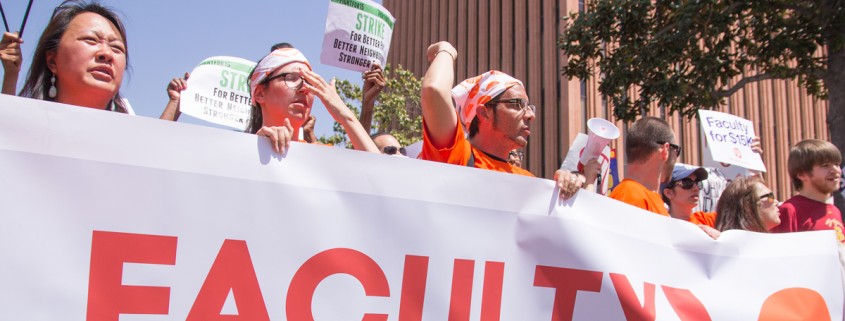NLRB reports USC violated federal laws
When non-tenure track faculty at the Dornsife College of Letters, Arts and Sciences voted not to join the SEIU Local 721 labor union, supporters of unionization were disappointed. However, they also said they were angry at what they saw as interference with the voting process on the part of the University. After the ballots were counted in February, they brought their complaint to the National Labor Relations Board, claiming that Provost Michael Quick and Academic Senate President Ginger Clark had used threats and last-minute pay raises to convince faculty members not to unionize.
A report released by the NLRB Monday supported these objections and rendered the original Dornsife vote invalid. The ruling, issued by NLRB Hearing Officer Yaneth Palencia, found that Quick and the USC administration broke federal labor laws by attempting to dissuade adjunct faculty from voting for the union. Though the University will face no legal action, the vote results will be set aside and a new vote will take place within the coming weeks. Votes at the Roski School of Fine Arts and the USC International Academy, which voted to unionize, will remain in place.
SEIU Local 721 petitioned the case to the NLRB on behalf of Dornsife non-tenure track faculty in a hearing that took place in February, during which Palencia heard testimony from both the faculty members and the University. According to the report, SEIU alleged that Quick told faculty that joining a union might prevent them from participating in the Academic Senate, which is described by the Senate Constitution as the “representative body of the faculty at large for university wide issues.”
In the testimony, faculty recalled Quick saying at a Jan. 11 meeting that unionization “would create an adversarial relationship,” and that unionized faculty from Dornsife, Roski and the International Academy “would not be wanted on the Academic Senate.” Quick echoed these statements in emails sent throughout the months preceding the vote, in which he urged non-tenure track faculty to reconsider voting to join the union. The petitioners claimed that the language in these emails as well as in his spoken statements was threatening enough to prevent some faculty from voting.
Petitioners also objected to Clark’s attempt to remedy faculty grievances prior to the vote as a way to convince faculty that unionization was unnecessary, a claim that Palencia rejected in the report. However, she sustained faculty objections to pay increases that Quick introduced as little as a week prior to the vote, writing that these actions in conjunction with the threats to faculty governance were enough to render the vote invalid.
“Provost Quick engaged in conduct that was so aggravated as to create a general atmosphere of fear making a free election impossible,” Palencia wrote in the report.
The ruling was met with praise from SEIU Local 721 President Bob Schoonover, who wrote that the findings “make it abundantly clear” that the actions of the university administration would have consequences.
“If you engage in illegal union-busting tactics we will hold you accountable,” Schoonover said in a press release.
The University, however, has denied the allegations that it threatened to remove unionized faculty from participating in the Academic Senate. Instead, it claims that Quick’s statements on the matter were simply meant to show that SEIU, and not the University, would be in charge of faculty governance if unionization were to take place. In a letter sent to faculty on Wednesday, Quick wrote that he is a “strong supporter of faculty governance” and that he never meant to dissuade anyone from voting.
“I believe that the initial vote — the will of the majority — should be respected,” Quick wrote in the letter. “I also know that a re-vote would be burdensome. But should a re-vote occur, I hope all Dornsife teaching faculty will turn out for this important vote.”
Some faculty members, however, believe that it may be too late to unionize. Andrea Parra, an associate professor of Spanish in the department of Spanish and Portuguese and a strong supporter of joining the union, said that she is hopeful that the results will be different this time around, but that nothing is guaranteed.
“I think the whole back and forth has turned people off to the issue,” Parra said. “I’m hopeful that more people will turn out, but it’s hard for me [to know]. I don’t have the crystal ball.”


Unions ruin everything. Remember that. Unions have no business in private schools.
union busting ruins everything
Actually, no. “Union Busting” is a fantastic idea. Public unions have largely outserved their original purpose. When unions first formed, they served a very noble purpose because labour was largely unregulated and unorganized, and workers enjoyed few protections under the hands of zealous or unscrupulous companies. Today, those grievances have all been addressed as a matter of law that governs labour at the federal and state levels. The unions now serve largely as puppets of the Democratic party, using their money and weight to enforce burdensome and onerous provisions on the very companies that employ their membership. (And lets not forget about the widespread corruption and secrecy.) In a way, the oppressed has become the oppressor.
you just show your stupidity.
how much is Jackson Lewis paying you to say that?